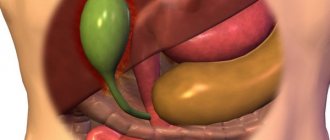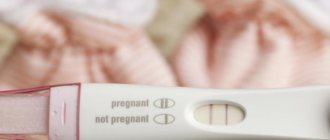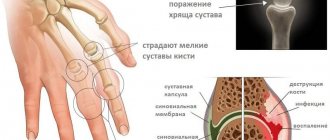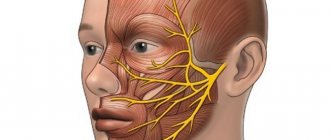General information
At some point in her life, cycle disturbances probably occurred in every woman. Irregular periods , which many women are accustomed to considering as something ordinary, are actually a signal of problems with women's health.
What is NMC in gynecology? This is a disrupted menstrual cycle that happens to women at different periods of their lives.
Irregular menstruation - delays or a shorter cycle, indicate disturbances in the physical or mental state of the woman. The monthly cycle is a kind of biological clock of the body. A disruption in their rhythm should alert you and cause you to consult a doctor so that diseases can be identified in a timely manner. Below we will talk about why the menstrual cycle fails and what a woman should do in such a situation.
What is the menstrual cycle
It is important to clearly know what the menstrual cycle is in women and what normal menstrual function should be.
Menarche , that is, the first menstruation, occurs in girls between 12 and 14 years of age. At what age girls start menstruating depends on where they live. The further south a teenager lives, the earlier menarche occurs. It is important for parents to monitor when girls begin menstruation in order to understand whether the body is developing normally.
Between the ages of 45 and 55, the menstrual period ends. This period is usually called premenopausal.
During menstruation, the functional layer of the uterine mucosa is rejected as a consequence of a decrease in progesterone in the body. A woman's monthly cycle is divided into three phases.
- Phase 1 , follicular, is characterized by the production of estrogens , under the influence of which follicles . From all the follicles, a dominant follicle is subsequently released, from which a mature egg is later released.
- Phase 2 of the menstrual cycle is the shortest phase, lasting approximately 1 day. At this time, the follicle ruptures and the egg is released from it. It is important to understand, when talking about what distinguishes the second phase of the menstrual cycle, that this is the time when the egg is ready for fertilization. This is the fertile phase when conception can occur.
- Phase 3 , luteal - the period when the synthesis of progesterone by the corpus luteum, which arose at the site of the ruptured follicle, begins. Progesterone prepares the endometrium for subsequent implantation of a fertilized egg. But if conception never occurs, the corpus luteum gradually dies, progesterone production decreases, and the endometrium is gradually rejected, that is, menstruation begins.
If progesterone deficiency is noted, estrogen production is activated again, and the cycle repeats again. For ease of perception, a diagram of the phases by day is useful, where all the phases of the cycle are indicated and what these phases are called.
Thus, the menstrual cycle is a cyclical change that occurs over a certain period of time. The duration of a normal cycle should be from 21 to 35 days. If there is a deviation in a certain direction for 3-5 days, this cannot be considered a pathology. However, if more significant changes are noted, then the woman should be wary of why the menstrual cycle is shortening or becoming longer.
If a woman has a normal menstrual cycle, how many days her period lasts is a purely individual indicator. The normal duration of menstruation is from three to seven days. It is important to take into account, paying attention to the duration, that this condition should not be a very difficult period for a woman. After all, an important characteristic is not only the normal duration, but also the fact that menstruation should not cause very strong discomfort. During this period, about 100-140 ml of blood is lost. If there is heavy blood loss or the woman notices that the retention rate is violated, it is important to immediately contact a gynecologist.
The cycle is regulated at 5 levels.
| The first level is the cerebral cortex | If your menstrual cycle is out of whack, the reasons may be related to emotions, stress, and worries. |
| Second level - hypothalamus | It contains a synthesis of releasing factors affecting the third level. |
| Third level - pituitary gland | Produces follicle-stimulating and luteinizing hormones or gonadotropic hormones that affect the fourth level. |
| Level four – ovaries | Under the influence of pituitary hormones, depending on the phase of the cycle, the synthesis of estrogen or progesterone occurs. |
| Fifth level – female genital organs | Changes in the endometrium occur in the uterus, the epithelium in the vagina is renewed, peristalsis is noted in the fallopian tubes, which facilitates the meeting of sperm and egg. |
https://youtu.be/92RoFZ3Y1zA
Traditional recipes for restoring menstruation
If deviations in health are not pathological in nature, you can choose a healthy diet for regulation - introduce foods with an optimal level of protein, a sufficient amount of fat, and flavonoids into the diet. Similar problems often arise in women who adhere to strict diets.
The normalization of the monthly cycle is facilitated by the use of folk remedies. They are gentler on the body. Long-term use of infusions and decoctions is possible. It is important to choose the right plants depending on the type of violation.
Folk recipes contain water pepper, mint, lemon balm, parsley and other herbs. You can induce or stop scanty periods with the help of fragrant rue, dodder, onion peel, and quinoa.
Herbal remedies for painful periods
Menstruation with pain (dysmenorrhea) is more often present at a young age. Discomfort occurs one or two days before the start of menstruation and continues for another 2 days.
You can relieve pain and alleviate the condition by resorting to traditional medicine:
- Sweet clover infusion relieves spasms and soothes pain. Pour 15 g of herb into 2 cups of boiling water and leave in a thermos for 2 hours. Strain, take 70–100 ml 2–3 times a day. An infusion of elecampane is prepared in the same way. It is also used to restore the cycle.
- A decoction of cinquefoil relieves painful menstruation. Pour 5 g of herb into 200 ml of milk, boil for 5 minutes, add 5 g of golden mustache juice. This decoction is drunk 2 times a day, 100 ml per dose.
- Melissa infusion not only relieves pain, but also calms. Pour 15 g of herb with a glass of boiling water, cover, wait 30 minutes, strain. Dosage – 1–2 tbsp. spoons 5-6 times a day.
Herbs for prolonged absence of menstruation
It is possible to establish the traditional menstrual cycle with the help of herbs if the failure is caused by the presence of inflammation or psycho-emotional abnormalities. Chamomile, St. John's wort, celandine, sage, string, and eucalyptus are used as anti-inflammatory agents.
The most effective herbs for normalizing the cycle:
- Three tbsp. Place spoons of parsley in a thermos and add 3 cups of boiling water. After a few hours, strain the infusion. Drink 0.5 cups 4 times a day before meals. The decoction is taken for 3 weeks, after a week's break the course can be repeated.
- Take equal amounts of nettle, Rhodiola rosea, wormwood, anise, viburnum berries, Leuzea rhizome, mantle and thyme. Grind 4 tablespoons of the mixture, pour into a thermos, pour 0.5 liters of boiling water. After 6–7 hours, the infusion is ready; it must be taken 50 ml twice a day. The course of treatment is 6 months.
- To prepare the decoction, you need the peel obtained from 1 kg of onions. It must be poured with 1.5 liters of boiling water and simmered over low heat until the liquid acquires a dark color. Drink 100 ml half an hour before meals twice a day.
Causes of menstrual irregularities
In fact, the causes of irregular menstruation are very diverse and there are many of them. Conventionally, the causes of menstrual irregularities can be divided into three groups:
- The first is external factors that affect the normal cycle. That is, etiological factors influence the cerebral cortex. A woman may note that the cycle has decreased or, conversely, it is longer, if she has suddenly changed the climate, was in a state of prolonged stress, “sat down” on a strict diet, etc.
- The second is a consequence of pathological conditions affecting not only the reproductive system, but also the body as a whole. Thus, the reasons for the disruption of the menstrual cycle after 40 years are often associated with the onset of menopause. However, it is possible that the reasons for the failure of the menstrual cycle after 40 years are due to the presence of health problems in a middle-aged woman.
- The third is the influence of medications. Often the answer to the question of why the menstrual cycle fails is treatment with a number of drugs. A delay or other failure is possible both after starting certain medications and after stopping them. We are talking about hormonal contraceptives, anticoagulants, antiplatelet agents, glucocorticoids, etc.
Causes of disharmony
The menstrual cycle of women is very labile, and even minor changes in the external environment or some diseases can lead to disruption. Disorders may appear only in one month or be constantly present in the body. If the reasons are temporary, then it is easier to correct the cycle without using hormonal drugs.
Sex hormone imbalance
This is the most common reason and cannot always be easily corrected. Disturbances in the hormonal profile can occur at any age, but during the period of formation of menstrual function and in the premenopausal period they occur more often.
At the same time, in young girls, cycle disturbances are allowed for two years after menarche and are normal. But if the malfunctions continue, it is imperative to undergo an examination and find out the cause for further correct treatment.
Disorders also occur 2–3 years before menopause. These can be both functional reasons and organic ones, for example, a cyst on the ovary. In most cases, menstruation becomes heavy, often with clots.
Hyperestrogenemia
A woman's menstrual cycle directly depends on the level of sex hormones in the blood. An increase in the amount of estrogen can cause disruptions; more often, the interval between critical days lengthens. Adipose tissue is the source of these hormones. It doesn’t matter in which area its excess deposition occurs - on the hips, in the abdomen, etc. In all women with increased body weight, the level of estrogen in the blood is higher than normal. And this entails cycle disruption, the formation of cysts on the ovaries and other dysfunctions.
Also, a sharp gain in body weight will lead to similar changes, and rapid weight loss will be expressed in a lack of hormones to which the body is already accustomed. Therefore, some time will also be needed to restore full functions.
Climate change
Many women note disruptions in the menstrual cycle even when the seasons of the year change, most often summer-autumn. This is primarily due to a decrease in daylight hours, as well as colder temperatures. It has been noticed that moving even for a short period to “warm countries”, especially with a sudden move, for example, on New Year or Christmas, when we are in the middle of winter, can cause a delay or, conversely, a premature onset of menstrual periods.
Use of drugs
Medications can also affect the cycle, especially if it is stimulated to increase the chances of pregnancy or during the IVF process. After unsuccessful attempts, the cycle may take a long time to be re-established.
Abortions, even miscarriages, are a sharp change in hormonal levels. This provokes various malfunctions and disorders, not only in the ovaries and uterus, but also in “dependent” organs, for example, in the mammary glands.
Stress
Paradoxical as it may seem, “all diseases come from nerves.” The time of onset of menstruation depends on the level of FSH, LH and some other active substances that are produced in special structures of the brain - the pituitary gland and hypothalamus. They are the “conductors” of the functioning of many organs, including the genitals.
Constant overload, stress, worries, fixation on something cause a disruption in the transmission of nerve impulses, as a result of which the hypothalamic-pituitary-ovarian connection is disrupted. Hence the disruption of the menstrual cycle. In such situations, it is highly likely that menstruation can be normalized without hormones.
Diseases of other organs
The state of the reproductive system largely depends on the functioning of other organs. The activity of the thyroid gland plays an important role. Often with hypothyroidism, changes in the ovaries with cycle disruption are observed.
The adrenal glands are involved in the synthesis of male sex hormones. Their functional disorders, hyperplasia, tumors cause an imbalance in the woman’s body and an increase in androgens. This leads to such manifestations as excess hair on the face, inner thighs, etc. In 70% of cases, various disruptions of the menstrual cycle occur: periods become irregular, heavy, often with clots, polyps in the uterine cavity are not uncommon, etc.
Today it is not difficult to find a woman who notes a constant or periodic increase in blood pressure. If the therapy chosen is inadequate, and there is also weakness of the vascular wall, clinically this can manifest itself in irregular spotting, especially during crises.
A special place is occupied by hormone-dependent tumors, for example, in the ovaries, thyroid gland, etc. By releasing an additional portion of estrogens and other substances, diseases provoke menstrual irregularities.
Gynecological diseases
Sometimes cycle disruption is associated with organic pathology in the uterine cavity, for example, polyps or endometrial hyperplasia, uterine fibroids, especially with submucous growth. Therefore, in case of any dysfunctions, you should initially undergo examination by a doctor.
Factors associated with pathological conditions
- Ovarian pathologies - we are talking about disruption of the connection between the ovaries and the pituitary gland , ovarian cancer, drug stimulation of ovulation, failure of the second phase of the cycle. Also, irregular periods associated with ovarian pathology can be a consequence of negative occupational exposures, radiation, vibration, and chemical influences. The reasons for an irregular menstrual cycle may be associated with surgical interventions performed on the ovaries, injuries to the genitourinary organs, etc.
- Disturbed interaction between the hypothalamus and pituitary gland - an irregular cycle may be associated with too active or insufficient release of gonadotropic hormones and releasing factors. Cycle disturbances are sometimes the result of a tumor of the pituitary gland or brain, hemorrhage in the pituitary gland, or necrosis.
- Endometriosis - if a woman develops endometriosis, both genital and extragenital, the hormonal nature of this disease leads to an imbalance of hormones.
- Violation of the blood clotting process - hemophilia, other genetic pathologies.
- Curettage of the uterus - the endometrium is damaged if curettage is performed after termination of pregnancy or for the purpose of treatment. As a result, complications may develop - inflammatory processes of the uterus and appendages. Irregular periods after childbirth are also observed.
- Liver and gallbladder diseases.
- The appearance of hormone-dependent tumors - oncological processes in the uterus, adrenal glands, mammary gland, thyroid gland.
- Endometritis in chronic form - the formation of a full-fledged endometrium does not occur.
- Polyps of the uterine mucosa.
- Sharp “jumps” in body weight – both weight loss and obesity provoke irregular periods in adolescents and adult women, as adipose tissue produces estrogens.
- Infectious diseases - can have a negative impact on the ovaries. Moreover, both infections that were suffered in childhood (for example, chickenpox or rubella ) and sexually transmitted infections can provoke a failure of menstruation.
- The presence of uterine anomalies - septum in the uterus, sexual infantilism, etc.
- Endocrine pathology - often associated with it are the causes of irregular periods after 40 years.
- Pathology of the uterus – tumors, hyperplasia.
- Mental illnesses – epilepsy, schizophrenia , etc.
- Arterial hypertension.
- Having bad habits.
- Vitamin deficiency, hypovitaminosis.
- Chromosomal abnormalities.
A gynecologist will tell you what to do in case of a particular health problem and how to normalize your cycle. You should definitely visit him if your periods are “off.”
How can a cycle disorder manifest itself?
Various shifts throughout the cycle should be considered a violation of the cycle. In this case, both changes in the duration of the cycle (irregular, rare, frequent periods) and disturbances in the nature of menstruation are possible.
- Amenorrhea – no periods for six months or more. With primary amenorrhea, disturbances are noted from the moment when menstruation begins in girls; in the secondary case, the disturbances appeared after a certain period of normal cycles.
- Oligomenorrhea - menstruation occurs once every few months (3-4). After 45 years, such manifestations may be associated with menopause .
- Opsomenorrhea is scanty menstruation lasting no more than 1-2 days.
- Polymenorrhea – prolonged menstruation (more than 7 days) during a normal cycle.
- Hyperpolymenorrhea - there is heavy discharge, but the cycle is normal.
- Menorrhagia – heavy and prolonged menstruation (more than 10 days).
- Metrorrhagia is the irregular appearance of bloody discharge, sometimes it can appear in the middle of the cycle.
- Proyomenorrhea is frequent menstruation in which the cycle is less than three weeks.
- Algomenorrhea is very painful menstruation, during which a woman becomes unable to work. Algomenorrhea can also be primary or secondary.
- Dysmenorrhea is the name given to any cycle disorder in which there is pain during menstruation and unpleasant vegetative disorders: headaches , unstable mood, vomiting and nausea, etc.
The cause of frequent periods, as well as other disorders described above, can be associated with a wide variety of pathologies. A woman should be alerted to any violations. For example, very frequent periods after 40 years of age may indicate the development of serious diseases.
How to restore menstruation using hormonal drugs
In some situations, the gynecologist prescribes a course of contraceptives. These drugs are used to restore the cycle, because they contain all the necessary vitamins that help normalize menstruation. There are also two medical products for restoring menstruation, containing all the beneficial hormones necessary for the female body:
- Utrozhenstan - prescribed for progesterone deficiency. Consumed 3 times a day, 1 tablet. This medication should be used exclusively on certain days of the menstrual cycle, recommended by a specialist.
- Duphaston is prescribed when menstruation is delayed for more than 5 days and there is no pregnancy. The medication causes menstruation in the shortest possible time. The medicine must be used on certain dates of the menstrual cycle, indicated by the gynecologist. You need to consume Duphaston 1-2 times a day, one tablet.
- Pregnoton - used when there is a large amount of prolactin. The increase in this hormone is associated with excessive nervous tension. A bag of medicinal powder should be diluted in a glass of warm water, mixed thoroughly until completely dissolved and drunk with meals. It is recommended to consume the medication no more than once a day for three months.
Cycle disorders in adolescents
Cycle disturbances are often observed in adolescents when menstruation begins. This phenomenon is due to physiological reasons. In girls, hormonal levels are developing, and both the reasons for a short menstrual cycle and the reasons for delays are associated with this. In adolescents, the duration of the cycle may be different each time.
The formation process can last for 1-2 years. But the girl must clearly know how to count the duration of the menstrual cycle in order to track how many days the cycle lasts and whether it is gradually developing. This is important not only for those who are already sexually active, but also for girls who need to know the duration of their cycle both for hygiene purposes and to monitor their health status. The mother must definitely explain to her daughter how to correctly count the menstrual cycle. An example of such a calculation is also important for a teenager.
There are the following pathological factors that influence the regularity of menstruation in adolescents:
- infections of the brain and membranes;
- traumatic brain injuries;
- vegetative-vascular dystonia;
- frequent colds;
- sexual infections;
- sclerocystic ovaries.
The formation of the monthly cycle is also negatively affected by the fact that young girls practice strict diets, as a result of which not only excessive weight loss is noted, but also hypovitaminosis and menstrual irregularities.
Interestingly, the regularity of menstruation is influenced by the personality traits of adolescents.
Doctors identify several more important factors that can affect the formation of the cycle:
- early onset of sexual activity, promiscuity;
- abnormalities in the development of the reproductive system;
- presence of bad habits.
Due to an irregular menstrual cycle, a teenage girl may experience so-called juvenile uterine bleeding . This condition is characterized by prolonged periods. As a rule, long and heavy periods last more than a week. This leads to anemia and serious deterioration in the teenager's condition. As a rule, the causes of long periods are associated with either mental stress or infections.
Disrupted cycle during premenopause
During menopause , which in women begins between 45 and 55 years of age, not only the cycle is disrupted, but also vegetative-vascular symptoms, metabolic disorders, and psycho-emotional instability are noted.
The menstrual cycle during premenopause is disrupted due to the gradual decline of reproductive function. The production of gonadotropins at the level of the pituitary gland is disrupted, as a result of which the maturation of follicles in the gonads is disrupted. During menopause, luteal insufficiency is observed against the background of hyperestrogenism. As a result, pathological changes occur in the endometrium in both phases of the cycle. The woman experiences both cyclic and acyclic bleeding due to the development of endometrial hyperplasia.
Provided that after 40 years, a woman’s menstruation has become rare and irregular, or she is experiencing acyclic bleeding, this is most likely evidence of premature ovarian failure. Why the cycle changes must be determined by a doctor. Early manifestations of menopause require the use of hormone replacement therapy.
Why do periods get lost?
There are many reasons for menstrual irregularities. In adolescence and premenopause, disruptions are explained by hormonal fluctuations. In adult girls and women, irregular periods can be caused by factors such as:
- Strict diet.
- Overweight.
- Inflammatory diseases.
- Low stress resistance.
- Change of climate zone.
- Excessive physical activity.
- Use of oral contraceptives.
- Thyroid diseases.
- Endometriosis and oncological changes of the uterus/ovaries.
Deviations of the menstrual cycle from the norm may have a physiological nature. During pregnancy, critical days, as a rule, do not come. But there are exceptions when the expectant mother continues to have her period. Also, the cycle is unstable during lactation.
If a woman is pregnant, breastfeeding or going through menopause, there is no need to worry. “Irregular” periods are considered the norm here, just like in Russia. In other cases, it is necessary to visit a gynecologist, undergo an examination and determine the cause of the anomaly.
The body functions properly in the absence of nutritional deficiencies. A balanced diet containing vegetable oils, polyunsaturated fatty acids, fruits, vegetables, herbs and sea fish will help a woman get her period back.
Ways to restore the menstrual cycle
Self-medication if your period has disappeared is strictly prohibited. The female reproductive system is complex. It bears not only the reproductive function, but also responsibility for the condition of the body as a whole.
If you let the situation take its course, you can cause irreparable harm to your own health. The gynecologist will be able to figure out why the patient’s critical days have disappeared thanks to diagnostics:
- Examination of the genitals on a chair.
- Analysis of vaginal secretions (smear).
- Ultrasound of the pelvic organs.
If menstruation has stopped due to pregnancy or lactation, no measures need to be taken. The cycle will resolve itself at the right time.
A patient in menopause may be prescribed a course of hormone replacement therapy. If the deviation is associated with infectious and inflammatory processes in the genital area, they should first be treated with antibacterial drugs. The cycle returns to normal after the inflammation is relieved.
Sometimes the menstrual schedule gets disrupted due to taking certain medications. In this case, the drug is either replaced or the dosage regimen is adjusted. If the cycle is disrupted after a sore throat, acute respiratory viral infection, or influenza, medicinal herbs can be used to regulate bleeding.
Stressful situations and hard work can also affect the rhythm of menstruation. To prevent a complete cessation of menstruation, a woman is advised to eliminate the causes of stress and replan her daily routine so that more time is left for proper rest. A holiday at a resort will be useful.
If overwork and instability of the menstrual cycle are caused by hard work, it is necessary to change the field of activity. The athlete should adjust her training regimen.
If your cycle is disrupted due to a strict diet, a nutritionist or nutritionist will tell you how to restore your periods after losing weight.
Consultation with a nutritionist
It is necessary to eat so that the body does not feel a lack of fats, proteins, carbohydrates and other nutrients. The daily menu should be light, satisfying and fortified. Instead of fatty and spicy foods, you need to eat dairy dishes, soups and cereals.
A revision of eating habits must necessarily be supported by positive changes in the psycho-emotional state. If the body is depleted due to anorexia nervosa, a woman may need to consult a professional psychologist.
If your periods are disrupted due to obesity, the recommendations are the same as in the case of excessive weight loss. Only the girl will still need moderate physical activity.
Useful video:
Drug therapy
A gynecologist prescribes medications to restore a normal menstrual cycle. Based on the clinical picture, the specialist prescribes the following types of drugs to the patient:
- With artificial hormones.
- With phytohormones.
The first group includes Cycloproginova, Cliogest and Divitren.
The first medicine replenishes estrogen deficiency, improves endometrial regeneration and its perception of the effects of progesterone. The second remedy contains equal doses of estrogen and progesterone. Hormones normalize the cycle, prevent uterine bleeding and alleviate the symptoms of menopause.
Also, during menopause with menstrual irregularities, Divitren is widely used. Its components imitate natural hormonal activity in the body. The drug prevents the development of processes of malignancy and endometrial hyperplasia.
The series of preparations containing phytohormones includes:
- Feminal - solves the problem of PMS and acyclic bleeding, improves well-being during menopause and normalizes the monthly course of menstruation.
- Besser Alter is a product based on Altai herbs. Improves the functioning of the appendages, eliminates hot flashes and irritation. To restore reproductive function, Besser Alter can be taken in premenopause, menopause and postmenopause.
- Estrovel - dietary supplement corrects the menstrual cycle, rearranges hormonal status in the right way, improves well-being during PMS.
Vitamins and medicines with herbal components are good for restoring the menstrual cycle only in cases where treatment can be carried out without hormones. But even herbal tablets and drops must be taken under the supervision of a doctor and with mandatory adherence to the regimen and doses of therapy.
Disorders due to hormonal medications
If a woman takes contraceptives , intermenstrual bleeding is likely to occur in the first three months of use. Such bleeding should be considered normal, since at first the body adapts to the fact that hormones enter it and suppresses the production of its own hormones. But if acyclic bleeding occurs for longer than three months, or if your period does not end for too long while taking birth control, it is likely that the drug was chosen incorrectly - perhaps the woman is receiving too high or low a dose of hormones.
algomenorrhea may develop . Uterine bleeding is highly likely to occur if a woman uses emergency contraception. The fact is that they contain a very large dose of hormones. Therefore, such products cannot be used more often than once a year.
The development of amenorrhea is observed against the background of the use of injections long-acting progestins Therefore, progestins are often prescribed to premenopausal women, as well as to patients with endometriosis, to induce artificial menopause if necessary.
If the cycle is disrupted, the normalization of the menstrual cycle in women is carried out taking into account the reason for which it occurred. Also, in order to normalize the cycle, the doctor takes into account the woman’s age, clinical symptoms, and the presence of diseases. Only after this are prescribed pills for normalization, vitamin therapy ( vitamin E , etc.).
Using traditional methods
In addition to drug treatment, you can also use traditional methods. Be sure to consult your doctor first.
- Upland grass. This plant has gained incredible popularity thanks to reviews from women. She greatly helped those who experienced cycle problems or could not conceive a child. For 1 tablespoon of dry plant you need to take a glass of boiling water. Pour in the herb and steam in a water bath for half an hour. Take the resulting infusion one tablespoon 4 times a day.
- Pour the peels from two kilograms of onion with three liters of water. Boil the broth until it turns a deep red color. You need to take it one tablespoon 3 times a day.
- Nettle. Pour 1 tablespoon of dry nettle with a glass of boiling water. Infuse the drink for about 30 minutes, and then drink in small portions throughout the day.
- Wormwood decoction. Pour boiling water over a quarter tablespoon and leave for about an hour. You need to take the infusion one teaspoon per day. You should not drink it for a long time.
- Decoction of bay leaf. According to the reviews of most girls, it is an excellent remedy to restore the cycle. For 10 grams of sheets you need to take 50 ml of boiling water. Pour in the bay leaf and boil for about 10 minutes. Let the infusion cool and drink a quarter glass once a day before meals. This product does not taste very pleasant, but is extremely effective.
To prevent disruptions in the menstrual cycle, it is important to lead a healthy lifestyle and learn to avoid stress.
- First of all, you need to learn to distract yourself from work and personal problems. Had a fight with your friend? Take a bath and drink herbal tea. Emergency at work? Go to the cinema to watch a positive film, or meet a friend in a cafe. If nervous tension does not leave you, take a course of light sedatives and sign up for a massage.
- Proper nutrition. Moreover, strict diets have nothing to do with it. A balanced diet is the presence of fats, proteins and carbohydrates. Fats are especially important for the female body - sea fish, nuts, avocado, vegetable oil. Flaxseeds and oil are very beneficial for the female body. The diet must include meat, fish, vegetables, fruits, and grains. Moreover, it is absolutely not necessary to buy expensive salmon. There is a more affordable fish that contains enough useful acids - herring, mackerel, cod, hake, pink salmon, chum salmon. As you can see, the choice is great. It is better to choose carbohydrates in the form of cereals and fruits than in the form of sugar and pies.
- Exercise in moderation. Excessive overload does not lead to good things. Also, be sure to learn not to take on extra work or overexert yourself. The ideal activity for a woman is yoga.
- Get enough sleep. The key to a woman's health is sleep. It is during sleep that hormones are produced that maintain health and youth. If you wake up early all week, allow yourself to sleep in on your day off. Also, try to go to bed earlier.
- Check with your doctor regularly. You need to visit a gynecologist at least once a year. The doctor will take smears and examine the uterine cavity and the condition of the cervix. In addition, it also prevents the occurrence of cancer, which can be successfully treated in the early stages.
- Regular sex is the key to women's health. Orgasm causes contractions of the uterus, which brings the onset of menstruation closer.
- It is extremely important to fully treat colds and other illnesses. In winter, flu is extremely dangerous. Be sure to stay in bed for at least a few days, and also take all medications prescribed by the doctor.
- Take vitamins. It is best to pay attention to those complexes that are designed specifically for women. They maintain the optimal balance of all microelements that the female body needs so much. For example, these are vitamins B and E.
- If you have problems such as fibroids and endometriosis, you should absolutely not visit the bathhouse or solarium. This can cause accelerated growth of pathological formations, which will lead to disruption of the menstrual cycle.
If possible, it is best to go to the sea or undergo treatment in a specialized sanatorium. Some institutions successfully treat gynecological problems with the help of mud, mineral baths, proper nutrition, and light physical activity. We hope that our tips will help you normalize your cycle.
Treatment of menstruation disorders in adolescents
If a teenage girl has a disturbed menstrual cycle, and the condition is complicated by juvenile bleeding, two-stage therapy is performed.
At the first stage, hemostasis is carried out with hormonal drugs, hemostatic tablets are used for bleeding - Vikasol , Dicynon , aminocaproic acid .
In case of prolonged severe bleeding, when the girl is worried about weakness, dizziness, and at the same time her hemoglobin (up to 70 g/l), the doctor decides to perform curettage. Next, a histological examination of the scraping is carried out.
Provided that the hemoglobin level is from 80 to 100 g/l, hormonal tablets are prescribed ( Mersilon , Marvelon , Novinet ).
Also, if necessary, antianemic therapy is carried out (blood transfusion, red blood cell transfusion, infucol, reopolyglucin). Iron supplements are also prescribed as part of the treatment regimen.
The teenager is prescribed hormonal drugs for a period of no more than three months. Treatment of anemia lasts until hemoglobin levels rise to normal.
If the disorder during the formation of the cycle is not complex, the girl is prescribed vitamin therapy according to the phases of the cycle. In this case, vitamins are used according to a certain scheme to stimulate the production of hormones in the ovaries. Cyclic vitamin therapy provides that in the first phase a woman takes a vitamin B complex or vitamins B1 and . In the second phase, the girl is shown Folic acid , ascorbic acid , as well as vitamins A and E.
Traditional treatment
If you have problems with the menstrual cycle, you should visit a gynecologist who, if necessary, will conduct a comprehensive clinical examination and prescribe appropriate treatment. What medications can be used to normalize the cycle:
- Cyclodinone.
- Agnucaston.
- Dysmenorm.
- Cyclovita.
- Duphaston.
Cyclodinone
A popular herbal medicine that can normalize the level of female sex hormones is Cyclodinone. The main pharmacological effect is associated with a decrease in prolactin production. It is reliably known that if there is a high level of prolactin, this affects the secretion of gonadotropic hormones, leading to an imbalance between progesterone and estrogen. This results in disruptions in the menstrual cycle and the appearance of painful sensations in the mammary glands (mastodynia), requiring adequate treatment.
By reducing the concentration of prolactin, Cyclodinone helps not only normalize menstruation, but also eliminate the pathological process in the mammary gland and relieve pain. In addition, the production of gonadotropic hormones is established. Based on the above, we can conclude that the main indications for the use of Cyclodinone will be:
- Menstrual disorder.
- Severe premenstrual syndrome.
- Painful sensations in the chest (mastodynia).
The only contraindications that should be noted are hypersensitivity to the components of the drug. Undesirable side effects are extremely rare. Isolated cases of the development of an allergic reaction (skin rashes, urticaria, itching, etc.), emotional agitation, confusion and hallucinatory states have been recorded. The duration of the therapeutic course is usually about 80–90 days. However, even after the cessation of clinical symptoms, it is recommended to continue treatment for several more weeks.
Despite the presence of lactose in the drug, there are no restrictions on the use of these medications by patients suffering from any form of diabetes. Buy pills to normalize your cycle at the pharmacy for about 450–480 rubles. The most famous analogue of Cylodinone is Agnukaston.
Taking medications to normalize the menstrual cycle should be agreed with a medical specialist.
Dysmenorm
One of the representatives of homeopathic medicines that normalize menstruation in girls and women of reproductive age is Dismenorm. As a rule, it is used in complex treatment for functional disorders of the menstrual cycle. It can also be used for premenstrual syndrome and painful menstruation. Dysmenorm is quite often prescribed if there are contraindications to hormonal treatment with drugs containing estrogens. According to clinical experience, most patients tolerate this medicine well.
The therapeutic course is quite long. The homeopathic remedy should be taken every day for at least three months. Taking into account the woman’s condition and the effectiveness of treatment, the gynecologist may prescribe a repeat course. Side effects are very rare. Mostly cases of allergic reactions and mild dyspeptic disorders (for example, nausea) were recorded. Some patients experienced a slight deterioration in their general condition during the first stages of treatment. In such situations, it is recommended to stop using the medicine. You can resume taking it after the woman’s condition improves.
The drug should not be taken by patients who are allergic to bee venom and lactose intolerant. If pregnancy occurs, the use of Dismenorm must be suspended. There is no information about cases of overdose. This medicine is available in pharmacies without a doctor's prescription. Homeopathic tablets, made in Germany, to normalize menstruation can be purchased at a price of 430–460 rubles per pack.
If hormonal imbalance is not treated, it can result in serious pathology and even infertility.
Cyclovita
Even without being a traditional medicine, but just a dietary supplement, Cyclovita is successfully used for various disorders of menstrual function. Repeated clinical studies have proven that a chronic lack of vitamins and minerals inevitably leads to pathological conditions in the reproductive system. At the same time, the optimal supply of these essential substances ensures the normalization of its work.
Cyclic vitamin and mineral therapy has found wide application in gynecological and obstetric practice. The basic principle is that at each phase of the cycle certain vitamins and minerals are prescribed, which have a beneficial effect on a woman’s hormonal balance. As an element of complex treatment, Cyclovita is often used for problems of the reproductive system such as:
- Irregular periods.
- Painful menstruation.
- Premenstrual syndrome.
- Discomfortable sensations in the mammary glands (engorgement, soreness, etc.).
The biological supplement Cyclovit includes two types of tablets, each of which must be taken at a certain phase of the cycle. Additional intake of vitamins and minerals is also especially useful for women in the following situations:
- High physical and psycho-emotional stress.
- Before menstruation.
- After gynecological diseases.
- Long-term use of hormonal contraceptives.
If the vitamin-mineral complex Cyclovit is used for at least 3 months, then many positive effects are observed, including a decrease in the clinical manifestations of premenstrual syndrome, normalization of the psycho-emotional sphere, restoration of the regularity of the menstrual cycle, and improvement of skin condition. A package of Cyclovit tablets costs approximately 1200–1300 rubles. Before purchasing a dietary supplement, be sure to consult a specialist.
Duphaston
Hormonal drugs that normalize the menstrual cycle include Duphaston. The active ingredient of the drug is dydrogesterone, which determines all its pharmacological properties. What are the indications for its use:
- Irregular and/or painful periods.
- Bleeding from the uterus of a dysfunctional nature.
- Premenstrual syndrome.
- Progesterone deficiency.
- Infertility associated with luteal phase disturbance.
- Endometriosis.
To normalize the cycle, Duphaston can be used only if it is precisely established that the cause of problems with the reproductive system is progesterone deficiency. Therefore, before prescribing any hormonal drugs, you should definitely undergo a general clinical examination. Do not forget that gynecological examinations and mammograms are recommended regularly for all girls and women of reproductive age, especially for menstrual disorders.
Adverse reactions occur rarely. However, if the following undesirable effects occur, you should stop taking the drug and rush to see your doctor:
- Anemia.
- Headache.
- Allergic reaction.
- Skin rashes.
- Itching sensation.
- Liver dysfunction.
- Heavy uterine bleeding.
It is necessary to prescribe hormonal medications with extreme caution to patients with heart and liver diseases, diabetes mellitus, epilepsy and migraines. The dosage and time of taking the drug should be determined by the doctor, taking into account the disease or pathological condition of the patient. The cost of Duphaston tablets is about 500–540 rubles.
Independent and uncontrolled use of various medications for menstrual irregularities (tablets, capsules, drops, suppositories and other drugs) often does not lead to anything good.
Utrozhestan
For menstrual disorders caused by progesterone deficiency, the hormonal drug Utrozhestan may be prescribed. Dysmenorrhea is not the only and, perhaps, not the main indication for its use. Utrozhestan is also used for benign tumors of the uterus, infertility, endometriosis for the prevention of premature birth, etc.
Taking the medicine in some patients is accompanied by the appearance of unwanted reactions. What side effects can you expect:
- Dysmenorrhea.
- Dyspeptic disorders (bloating, nausea, vomiting).
- Headache.
- Fatigue.
- Skin rashes, itching, urticaria.
- Depressive state.
It is worth recalling that treatment with hormonal drugs such as Duphaston, Utrozhestan and other analogues is strictly prohibited without the knowledge of the doctor. The price of a progesterone-containing drug ranges from 370–400 rubles. Before purchasing the medicine, carefully read the contraindications, side effects and restrictions for use specified in the official instructions.
Treatment of cycle disorders in women of childbearing age
Treatment of menstrual cycle disorders in this case is similar to the treatment regimen for such disorders in adolescents. Both at the age of twenty, and treatment of menstrual irregularities at the age of 40 with bleeding is carried out by curettage. It is carried out for both diagnostic and therapeutic purposes.
Next comes hormone therapy. Combined oral contraceptives are prescribed and used according to the usual regimen. If the second (luteal) phase is incomplete, progesterone analogues Utrozhestan or Duphaston ; they must be taken in the second phase of the cycle. It is also possible to take 17-OPK , Norkolut .
It is important to replenish the volume of circulating blood, for which colloidal solutions are used. Antianemic treatment and symptomatic hemostasis are also practiced. Provided that curettage does not work, the doctor may decide on hysterectomy or ablation (burning out) of the endometrium.
It is also important to properly treat those concomitant diseases that could provoke a cycle disorder. So, for hypertension, it is important to take prescribed medications and limit salty and liquid intake. If you have liver pathology, you should follow a proper diet and take hepatoprotectors.
Some women also practice treatment with folk remedies. However, such methods must be practiced very carefully, since without consulting a doctor there is a risk of missing a serious pathology. And even irregular menstruation after 45 years of age, perceived by a woman as the beginning of menopause, is a reason to consult a doctor.
Since cycle disruptions can cause infertility , women of childbearing age, if necessary, are prescribed Choriogonin and Pergonal - medications to stimulate the development of active follicles. To stimulate ovulation, you should take Clomiphene .
Bleeding during menopause
If there is bleeding during menopause, the patient must be prescribed curettage of the uterine cavity. After all, bleeding may indicate serious pathologies, in particular the development of atypical hyperplasia or endometrial adenocarcinoma . Sometimes a doctor may decide to perform a hysterectomy .
Sometimes a patient during menopause is prescribed gestagen medications: Depo-Provera , Duphaston , 17-OPK .
During treatment, antiestrogenic drugs can also be prescribed - Danazol , Gestrinone , 17a-ethynyl testosterone .
conclusions
If menstruation is disrupted, the question of how to restore the menstrual cycle must be addressed immediately by a woman of any age. Those who are interested in how to restore the menstrual cycle using folk remedies should remember that such manifestations are just a symptom of the underlying disease, which must be treated correctly, according to the regimen prescribed by a specialist.
To eliminate such problems, it is not always necessary to take hormonal pills to restore menstruation. Sometimes a woman for whom the question of how to restore the menstrual cycle without hormones is relevant, even changing her daily routine and eating habits helps. For example, weight normalization helps obese women. And for those who practice very strict diets, it is enough to increase the calorie intake and overcome the exhaustion of the body. In any case, if there are “problems” with the cycle, it is important for both young girls and women during menopause to consult a gynecologist who will tell you how to proceed.










